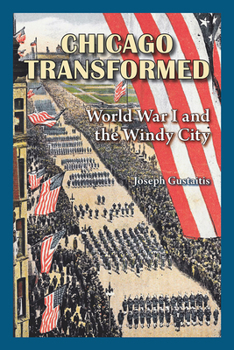Chicago Transformed: World War I and the Windy City
WINNER, Russell P. Strange Book of the Year Award from the Illinois State Historical Society, 2017 It's been called the "war that changed everything," and it is difficult to think of a historical event that had a greater impact on the world than the First World War. Events during the war profoundly changed our nation, and Chicago, especially, was transformed during this period. Between 1913 and 1919, Chicago transitioned from a nineteenth-century city to the metropolis it is today. Despite the importance of the war years, this period has not been documented adequately in histories of the city. In Chicago in World War I: How the Great War Transformed a Great City, Joseph Gustaitis fills this gap in the historical record, covering the important wartime events, developments, movements, and people that helped shape Chicago. Gustaitis attributes many of Chicago's changes to the labor shortage caused by the war. African Americans from the South flocked to Chicago during the Great Migration, and Mexican immigration increased as well. This influx of new populations along with a wave of anti-German hysteria--which nearly extinguished German culture in Chicago--changed the city's ethnic composition. As the ethnic landscape changed, so too did the culture. Jazz and blues accompanied African Americans to the city, and Chicago soon became America's jazz and blues capital. Gustaitis also demonstrates how the nation's first sexual revolution occurred not during the 1960s but during the World War I years, when the labor shortage opened up unprecedented employment opportunities for women. These opportunities gave women assertiveness and freedom that endured beyond the war years. In addition, the shortage of workers invigorated organized labor, and determined attempts were made to organize in Chicago's two leading industrial workplaces--the stockyards and the steel mills--which helped launch the union movement of the twentieth century. Gustaitis explores other topics as well: Prohibition, which practically defined the city in the 1920s; the exploits of Chicago's soldiers, both white and black; life on the home front; the War Exposition in Grant Park; and some of the city's contributions to the war effort. The book also contains sketches of the wartime activities of prominent Chicagoans, including Jane Addams, Ernest Hemingway, Clarence Darrow, Rabbi Emil Hirsch, John T. McCutcheon, "Big Bill" Thompson, and Eunice Tietjens. Although its focus is Chicago, this book provides insight into change nationwide, as many of the effects that the First World War had on the city also affected the United States as a whole. Drawing on a variety of sources and written in an accessible style that combines economic, cultural, and political history, Chicago in World War I: How the Great War Transformed a Great City portrays Chicago before the war, traces the changes initiated during the war years, and shows how these changes still endure in the cultural, ethnic, and political landscape of this great city and the nation.
Format:Paperback
Language:English
ISBN:0809334984
ISBN13:9780809334988
Release Date:July 2016
Publisher:Southern Illinois University Press
Length:368 Pages
Weight:1.36 lbs.
Dimensions:1.0" x 6.0" x 8.9"
Related Subjects
HistoryCustomer Reviews
0 rating





